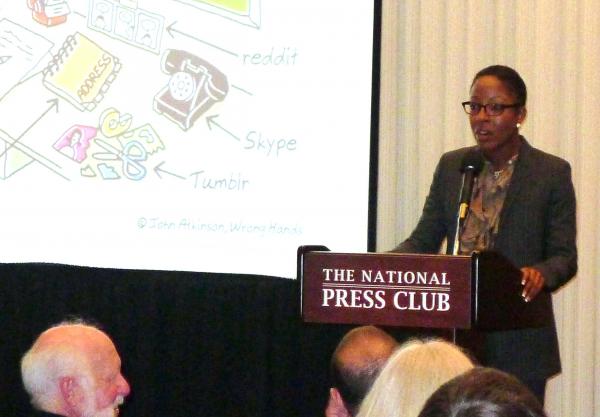Blog Posts
Summit opened grass roots discussion on transparancy
dcogcadmin | April 10, 2014
More than 100 community activists, journalists and city officials converged on the National Press Club March 19 to learn how free access to government information can improve everyday life in Washington neighborhoods.

Traci Hughes, Office of Open Government director, urges activism on transparenc
More than 100 community activists, journalists and city officials converged on the National Press Club March 19 to learn how free access to government information can improve everyday life in Washington neighborhoods.

Traci Hughes, Office of Open Government director, urges activism on transparenc
Debbie Cenziper, a Washington Post investigative reporter, spoke about her struggles to get city records for a series exposing government foreclosure practices that cost residents their homes because they failed to pay small debts about which they may have been unaware. She spent months fighting for access to records. But she learned from another summit attendee that help was available from the city’s Office of Open Government, which opened a year ago.
FOIA requests proved essential in community activist Marie Drissel’s efforts to expose and halt a city government’s attempt two years ago to approve online gambling. Drissel, a former Advisory Neighborhood Commissioner with a reputation as a municipal watchdog, advocated eliminating FOIA fees. They should be free, she insisted, because she gave journalists the records to share with the public.
“Government must tell us what they are doing and why they are doing it,” Drissel said. “They must do it all in the open.”
Community activist Leah Bannon, a Code for DC member, is using government data to help residents choose schools for their children. She said Code for DC is developing an app to provide school-specific data on teacher turnover rates and parent involvement , in addition to test scores.
Code for DC is a “group of volunteer civic hackers working together to solve local issues and help people engage with the city,” It has used city records to create other online tools for mapping restaurant health code violations and tracking emergency response times.
Getting the city to open its records “is just one piece of the puzzle,” according to Traci Hughes, director of the Office of Open Government. “Phase two is getting the public to engage with that data.” She noted that Code for DC members typically have expertise in gathering and sharing government data about their neighborhoods, but large segments of the city are not represented.
“Transparency and any policies around transparency must always consider every sector of our city and the ways in which residents are accessing information,” Hughes said. “If transparency is done the right way it will bridge the gap between those who have full access to technology and all of its uses, and those who have limited access or no access at all.”
The program was a learning experience for speakers, as well as the audience. Cenziper said, “I had no idea that there was an office to facilitate FOIA requests…. That’s an extra kind of defense for us when we have trouble getting our records.”
Hughes was pleased that Cenziper “knows that I am there as a resource,”
Corinna Zarek, D.C. Open Government Coalition vice president approached transparency from another direction, saying it is important to talk about ways the government can be more open and accountable to its citizens. “One challenge that we have moving forward is working with data and making sure that government folks have the training and education they need to provide that (data) to the public.”
The Coalition, the D.C. Professional Chapter of the Society of Professional Journalists, the American University School of Communications, and the National Press Club Freedom of the Press Committee sponsored the third annual Summit. The program was part of Sunshine Week, observanced an annual nationwide observance held every year in mid-March to highlight the importance of government transparency and press freedom.
Mia Miller is a journalism master’s degree candidate at American University. Fellow candidate Danielle DeCourcey contributed to this report.
